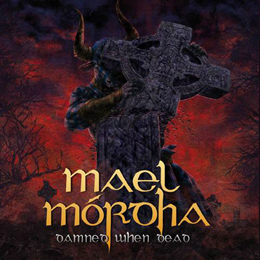
Doom Metal has many faces; that’s something we all know, that isn’t but a cheap side-line. Making abstraction of the Black-, Funeral-, Sludge- and Death-oriented sub-genres (amongst others), and concentrating on the more traditionally inspired bands, there are some huge different interpretations as well. There’s the so-called Epic-scene (with sword and shield), the Sixties-oriented one (with joint and mushroom), the sabbathesque clones (also with joint and mushroom), and so on, and so on. But whatever you turn the coin, you will more than once come to some specific sub-genres, or different acts, that make the scene all worth and interesting for its differentiation. Believe me, Doom isn’t just a limited musical style; it’s a philosophy that trespasses the average (with of course more than a handful of bands that make it all smell like fresh cow’s faeces; but that’s another discussion).
I wanted to introduce this review this way, for this Irish act is, like many other bands from Ireland, different from ‘the average’. First of all a (very) small biography: formed about fifteen years ago in Dublin; creators of some material that differs from the ‘usual’ scene, including lyrics in traditional Irish; and a musical approach that isn’t quite alike any other scene - the British one included. That was small, not?...
And secondly, after the introduction: the Musical Art. Mael Mordha indeed perform a doomish form of Metal, as you could read before. At the same time, this band creates a mixture of Doom-inspired Metal with traditional cultural elements. There are several bands that use the Celtic or Gaelic or Caledonia (etc.) influences to set their own specific mark. Mael Mordha do too, and more than once before, they do succeed, I think. I did enjoy all former material, but I wasn’t a ‘fan’. With Damned When Dead they do.
The explanation is simple. This album is a continuation of the former effort(s). But the material sounds much more convincing now. The sound is as heavy as before, but now it comes with a specific flair that we didn’t have the possibility to know yet. Besides, the epics itself have never sounded as powerful, overwhelming and inspiring before. A couple of songs, like the massive track Dawning Of The Grey, convince me with a glamorous performance that I surely missed on the former Mael Mordha-albums. The Sacking Of The Vedrafjord or the title track are other examples of splendid Epic / Pagan hymns, and as a matter of fact, most of the tracks balance in between ‘just fine’ and ‘more than just fine’.
With pride, Mael Mordha now can take place at the immortal side on the likes of, for example, Cruachan, Primordial or Mourning Beloveth.
